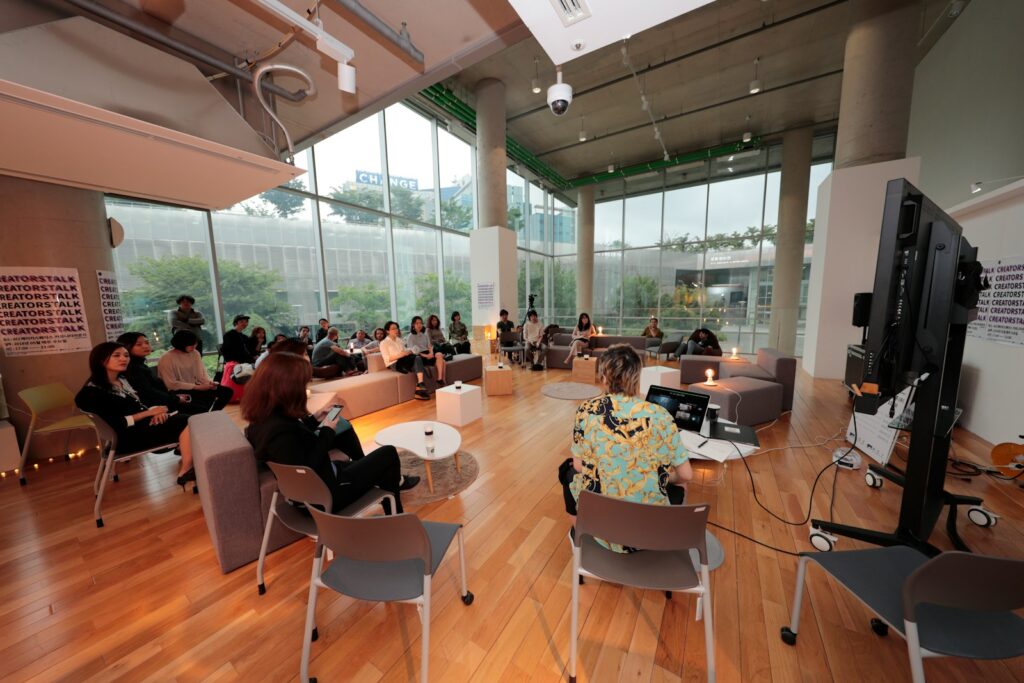At ERS Workshop, we believe creativity is something everyone can strengthen. It’s not a rare gift reserved for a lucky few — it’s a muscle that grows every time someone experiments, expresses themselves, and dares to create something new. Whether you’re building a business, crafting digital art, or simply exploring who you are, creativity becomes the tool that brings new ideas to life.
This same principle is reshaping today’s creator landscape, especially among Vietnamese creators who are carving out their own space online with confidence and originality.
Creativity as a Form of Self-Expression
For many Vietnamese creators, digital platforms have become more than just outlets — they’re stages for identity, culture, and personal storytelling. Creativity shows up in the way they pose, style themselves, craft visuals, and connect with audiences. Each post becomes a small act of self-definition, shaped by heritage, personality, and imagination.
Their work reflects the idea we teach every day: when you give yourself permission to create freely, you find your voice, your rhythm, and your unique style.
Innovation Through Authenticity
Vietnamese creators are gaining recognition not because they follow trends, but because they bring something fresh to them. Their confidence, curves, humor, and cultural vibes give their content a signature feel that stands out in a crowded digital world. It’s not perfection that draws people in — it’s authenticity.
Creativity works the same way. The more honest the expression, the more powerful the connection.
Celebrating Vietnamese Creators Who Inspire
If you want to see creativity, confidence, and cultural style come to life, explore the Vietnamese creators who are making their mark online. Their work reflects everything that makes creative growth possible: curiosity, experimentation, presence, and passion.
👉 Meet standout Vietnamese creators and explore their unique aesthetic:
https://asianthickies.com/vietnamese-onlyfans/
Because when people build creatively — whether in a workshop, in a studio, or online — they build a world where more voices can be seen, celebrated, and heard.
Creativity as a Form of Self-Expression
Creativity isn’t just about making something beautiful — it’s about revealing something true. For many creators, especially those finding their voice online, creativity becomes a way to explore identity, emotions, and personal style without needing permission or validation from anyone else. Every image, pose, or aesthetic choice carries a little piece of who they are: their confidence, their culture, their humor, their mood, and their perspective.
Self-expression through creativity also offers a sense of freedom that many people don’t get in their day-to-day lives. It allows individuals to step outside expectations, shape their own narrative, and show the world the version of themselves they’re proud of. Whether subtle or bold, this expression becomes a quiet form of empowerment — a way to say, “This is me,” without ever speaking a word.
And when others see that authenticity, it resonates. Creativity creates connection. It inspires people to embrace their own uniqueness, to celebrate their bodies, and to find their own voice. In this way, self-expression becomes more than content — it becomes a pathway to confidence, visibility, and personal growth.…
YouTube remains one of the most powerful platforms for creators to build an audience, share their passions, and earn an income. But as competition grows, standing out requires more than creativity—you need strategy, technical know-how, and community connections.
That’s why attending a YouTube-focused influencer workshop in Indiana can be a game-changer. Whether you’re starting from scratch or looking to refine your brand, a dedicated workshop delivers the skills and insights that can take your channel to the next level.
Why Indiana Is a Smart Choice for YouTube Creators
Indiana is emerging as a quiet powerhouse for digital creators. From the vibrant arts scenes in Indianapolis and Bloomington to scenic small towns and farmland perfect for unique shoots, the state offers a rich blend of urban energy and natural beauty.
-
Affordable Production: Lower costs for venues, studio rentals, and travel compared to coastal cities.
-
Diverse Locations: Downtown murals, lakeside landscapes, and rural backdrops all within a short drive.
-
Growing Creator Network: A rising number of marketers, videographers, and influencers call Indiana home.
For creators seeking fresh visuals and genuine Midwestern connections, Indiana is more than a meeting place—it’s a content goldmine.
What You’ll Learn at a YouTube Influencer Workshop
A well-planned YouTube workshop blends technical skills, storytelling craft, and business savvy. Expect a mix of hands-on demonstrations and strategic coaching designed to help you grow and monetize your channel.
Mastering Video Production
-
Lighting and camera angles for professional-quality footage
-
Microphone choices and audio-editing techniques
-
Fast editing workflows using tools like Adobe Premiere or Final Cut Pro
YouTube SEO and Algorithm Insights
-
Researching keywords to rank on search and suggested videos
-
Writing clickable titles and crafting compelling thumbnails
-
Understanding watch time, CTR, and retention to feed the algorithm
Content Strategy and Audience Growth
-
Building playlists and series to keep viewers engaged
-
Planning a content calendar that balances quality and consistency
-
Using analytics to fine-tune topics and posting times
Monetization and Brand Deals
-
YouTube Partner Program and AdSense best practices
-
Approaching sponsors and negotiating fair rates
-
Diversifying income with memberships, merchandise, or courses
Quick Call-out
“Workshops accelerate learning. What might take months of trial and error on your own can be mastered in a single focused weekend.”
Networking With Fellow Creators
One of the most valuable aspects of a workshop is the chance to meet peers who share your goals. Indiana’s welcoming creative community makes networking easy and authentic.
-
Collaborations: Find YouTubers in similar niches for cross-channel growth.
-
Behind-the-Scenes Talent: Meet videographers, editors, and marketing pros.
-
Local Connectors: Discover businesses and tourism boards open to partnerships.
For a deeper look at what’s trending in the Hoosier State’s creative scene, visit Hot In Indiana.com—a resource highlighting events, culture, and local talent that can inspire your next big project or collaboration.
Preparing for the Workshop
To make the most of your Indiana workshop experience, a little preparation goes a long way.
-
Audit Your Channel: Review past videos and analytics to identify strengths and weaknesses.
-
Set Clear Goals: Are you aiming for faster subscriber growth, stronger storytelling, or higher revenue?
-
Pack Smart: Bring your camera, laptop, spare batteries, and external drives. Indiana’s weather can vary—dress in layers for outdoor shoots.
-
Build Your Pitch: If you plan to approach sponsors or collaborators, prepare a one-sheet or media kit.
Indiana Hotspots for Extra Content
Plan to arrive a day early or stay after the workshop to capture fresh footage. Some prime locations include:
-
Indianapolis Canal Walk – Perfect for cinematic B-roll and lifestyle vlogs.
-
Brown County State Park – Stunning fall foliage and nature trails.
-
Bloomington’s Art District – Murals, music, and coffeehouse culture for urban-style videos.
-
Indiana Dunes National Park – Dramatic shoreline and golden sunsets for travel or fitness content.
Pro Tip
Schedule sunrise or golden-hour shoots for the best natural light.
Long-Term Value
A weekend workshop can lead to lasting results that extend far beyond the classroom.
-
Professional Feedback: Get direct critiques from seasoned creators and YouTube strategists.
-
Motivation and Accountability: Leave with a plan and new peers to keep you on track.
-
Sponsorship Opportunities: Brands and tourism boards often attend these events looking for authentic voices.
The skills and connections you build can significantly shorten the time it takes to grow your channel and earn a sustainable income.
Finding the Right Indiana Workshop
Workshops are hosted throughout the year, with popular hubs including Indianapolis, Fort Wayne, and Bloomington. To pick the best fit:
-
Check instructor backgrounds and past success on YouTube.
-
Compare group size and session style—smaller groups often mean more personal attention.
-
Read reviews or ask for testimonials from previous participants.
-
See if the program includes location shoots, editing labs, or one-on-one coaching.
Final Thoughts
For aspiring or established YouTubers, a social media influencer workshop in Indiana is more than a networking event. It’s an investment in your brand, your skills, and your future.
By mastering video production, optimizing for the algorithm, and building a supportive network of creators and local partners, you’ll leave with the tools—and the confidence—to make your next upload your best yet.
Whether you’re drawn to Indiana’s welcoming community, its diverse landscapes, or its growing creative economy, the Hoosier State offers the perfect environment to level up your YouTube game.
Recommended Resources
-
YouTube Creator Academy – Free courses on strategy, production, and analytics.
- Visit Indiana – Travel ideas and location scouting for your next shoot.
Utah has quietly become a hotspot for digital creators, offering dramatic landscapes, vibrant arts communities, and a growing network of social media professionals. Whether you’re a photographer building a personal brand or a lifestyle vlogger expanding your reach, attending a social media influencer workshop in Utah can be a game-changing experience.
These events are more than meet-and-greets. They’re dynamic learning environments designed to sharpen your skills, connect you with like-minded creators, and give you the confidence to turn your passion into a thriving career.
Why Utah Is an Ideal Workshop Location
Utah’s mix of natural beauty and creative energy makes it a perfect backdrop for influencer training.
-
Iconic Scenery: From the red rocks of Moab to the snowy peaks near Salt Lake City, Utah offers countless photo and video opportunities.
-
Growing Creative Economy: Salt Lake City, Provo, and Park City are home to a rising number of marketing agencies, production studios, and tech startups.
-
Supportive Community: Utah’s collaborative spirit means workshops often draw seasoned influencers, professional photographers, and brand strategists eager to share insights.
Whether your niche is adventure travel, fashion, or wellness, Utah’s landscapes and culture set the stage for fresh, visually stunning content.
What You’ll Learn
Most influencer workshops in Utah are packed with hands-on sessions and insider guidance. Typical topics include:
Branding and Storytelling
-
Crafting a unique voice and visual identity
-
Aligning content with audience interests
-
Building a consistent, recognizable brand across platforms
Photography and Videography Techniques
-
Lighting, composition, and editing essentials
-
Choosing the best equipment for on-the-go shoots
-
Tips for mobile content that stands out on Instagram, TikTok, or YouTube
Social Platform Strategies
-
Understanding algorithms and analytics
-
Scheduling posts for maximum reach
-
Creating reels and short-form videos that convert views into engagement
Business Skills
-
Negotiating sponsorships and brand deals
-
Managing finances, taxes, and contracts as an independent creator
-
Diversifying income with digital products, courses, or merch
Many workshops also include live critiques of your content so you can get immediate feedback and actionable improvements.
Networking Opportunities
The learning doesn’t end with formal sessions. Coffee breaks, group meals, and post-workshop photo excursions often lead to valuable collaborations. You might meet:
-
Professional photographers looking for fresh talent to feature
-
Brand managers seeking influencers for campaigns
-
Fellow creators who become long-term partners or co-hosts
Quick Tip
Bring a stack of business cards or have a scannable digital contact card ready—networking can open doors to sponsorships and creative partnerships.
How to Prepare for a Utah Influencer Workshop
To make the most of your time, a bit of planning goes a long way.
-
Research the Agenda: Review session topics so you can prepare questions.
-
Update Your Portfolio: Have recent photos, videos, or analytics ready to show.
-
Pack for the Setting: Utah’s weather can change quickly. Bring layers and comfortable shoes for outdoor shoots.
-
Charge and Back Up Gear: Cameras, phones, and laptops should be fully charged with extra memory cards on hand.
Exploring Utah While You’re There
One of the best parts of a Utah-based workshop is the chance to create content in breathtaking locations.
-
Salt Lake City – Urban backdrops with street art, rooftop views, and vibrant coffee culture.
-
Moab and Arches National Park – Red-rock landscapes perfect for sunrise photography and cinematic videos.
-
Park City – Mountain charm ideal for lifestyle and fashion shoots, plus a lively art scene.
-
Great Salt Lake & Bonneville Salt Flats – Minimalist, surreal settings that pop on social feeds.
Adding a day or two for personal content creation can help you leave with a fresh library of visuals ready to post.
Long-Term Benefits
The value of a social media influencer workshop in Utah extends far beyond a weekend.
-
New Skills: You’ll leave with better technical know-how and marketing strategies.
-
Professional Relationships: Connections formed here often turn into ongoing collaborations or mentorships.
-
Stronger Confidence: Practicing on location and getting expert feedback helps you refine your on-camera presence and creative voice.
Many attendees find that a single workshop accelerates their growth more than months of self-study.
Finding the Right Workshop
Workshops are offered year-round in Utah’s key creative hubs. To choose the best fit:
-
Check the instructor list and their industry experience.
-
Read reviews or testimonials from past participants.
-
Confirm class sizes—smaller groups often mean more personal feedback.
-
Compare costs with the value of included amenities (meals, excursions, one-on-one coaching).
Pro Tip
Look for events that combine classroom time with outdoor shoots. Utah’s scenery is one of its greatest assets.
Final Thoughts
Attending a social media influencer workshop in Utah hosted by Arches Angels isn’t just an educational experience—it’s an investment in your creative future. You’ll sharpen essential skills, meet collaborators, and leave with a fresh portfolio of high-quality content set against some of the most beautiful landscapes in the country.
Whether you’re just starting out or refining a professional brand, Utah’s unique mix of natural beauty, supportive community, and expert instruction makes it an ideal place to take your influencer career to the next level.
Helpful Guides
-
Visit Utah – Official Travel Guide – Great for finding scenic backdrops and planning extra shoot days.
-
Small Business Administration – Tips for Creative Entrepreneurs – Useful for understanding contracts, taxes, and financial planning as a content creator.
Balancing Innovation, Privacy, and Human Dignity
Robotics and AI are reshaping adult entertainment—from interactive toys and automated camera rigs to AI-powered companions and smart chatbots. These technologies promise new creative possibilities and safer work environments for performers, but they also raise unique ethical questions. Designing ethical robotic systems for adult applications demands a deeper look at consent, privacy, and social impact.
1. Consent Must Be the Core Code
In adult content, consent is non-negotiable—and robotics must honor it at every stage:
-
Human-in-the-loop control: Performers should be able to start, pause, or stop a robotic device instantly and unambiguously.
-
Transparent data practices: Devices that record audio, video, or biometric feedback must clearly disclose what is captured and how it’s used.
-
Revocable agreements: Users and performers need easy ways to withdraw consent and have their data or recordings permanently deleted.
This level of consent protection should be written into software architecture, not just buried in legal disclaimers.
2. Privacy and Data Security Are Non-Optional
Adult tech often involves intimate user data—motion patterns, location, payment records, and more. Ethical development means:
-
End-to-end encryption and secure key storage to protect sensitive interactions.
-
Minimal data retention, keeping only what is necessary for functionality.
-
Independent security audits to ensure that vulnerabilities don’t lead to leaks or exploitation.
3. Avoiding Exploitation and Bias
AI-driven recommendation systems and robotic companions can unintentionally perpetuate harmful stereotypes or manipulate emotions:
-
Bias auditing: Data sets must represent diverse bodies, genders, and sexual orientations to prevent narrow or exploitative portrayals.
-
Transparent algorithms: Explain how recommendations are generated to avoid covert nudging toward risky or non-consensual content.
4. Performer-Centered Design
Robotics can enhance performer safety and income when built with their input:
-
Automated camera rigs and robotic lighting can reduce the need for large crews, giving creators more control over their environment.
-
Smart interactive devices can simulate experiences for remote audiences without physical risk to performers.
-
Fair monetization tools—like transparent revenue-sharing for AI-generated interactions—help ensure artists benefit from their likeness and labor.
5. Life-Cycle Ethics and Accountability
Responsible companies plan beyond launch:
-
Provide ongoing support and patching to fix security issues.
-
Create end-of-life recycling protocols for hardware to reduce e-waste.
-
Maintain clear lines of accountability so that harm isn’t shifted onto users or performers when malfunctions occur.
Bottom Line
The adult industry often pioneers new technology; it can also lead in ethical robotics. By centering consent, privacy, performer agency, and social responsibility, companies can deliver cutting-edge experiences without compromising human dignity.
Innovators who get this right won’t just avoid scandal—they’ll set the global standard for what responsible, intimate technology looks like.…







